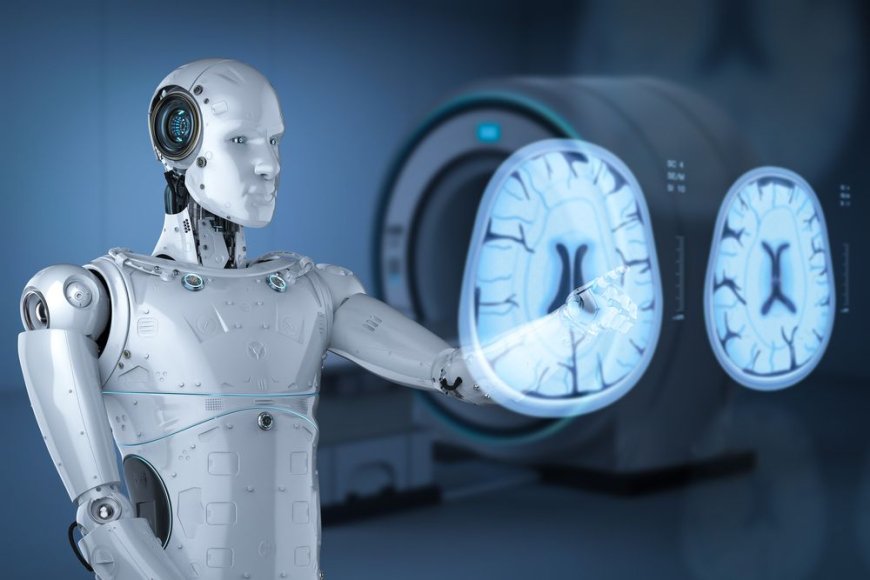Artificial Intelligence in MRI Market is Anticipated to Witness High Growth Owing to Increasing Applications in Diagnostics
The Global Artificial Intelligence in MRI Market is estimated to be valued at US$ 5.80 Bn in 2024 and is expected to exhibit a CAGR of 6.1% over the forecast period from 2024 to 2031.

Artificial intelligence (AI) in MRI technology utilizes machine learning and deep learning algorithms for improved image analysis and clinical decision support. AI helps radiologists detect and diagnose conditions with improved accuracy and productivity. MRI scans often generate large volumes of patient data that can benefit from artificial intelligence tools for rapid evaluation. The integration of AI with MRI systems enables accelerated image interpretation and disease detection. MRI scans typically analyze a patient's soft tissues, organs, and bones to identify injuries, diseases, or other abnormalities. AI tools have shown promise in detecting and diagnosing cancer, cardiovascular diseases, neurological disorders, and musculoskeletal conditions more effectively.
The Global Artificial Intelligence in MRI Market is estimated to be valued at US$ 5.80 Bn in 2024 and is expected to exhibit a CAGR of 6.1% over the forecast period from 2024 to 2031.
Rapid advances in deep learning algorithms for medical imaging and growing investment from leading AI companies are fueling market growth.
Key Takeaways
Artificial Intelligence In MRI Market Companies I are GE Healthcare, Siemens Healthineers, Canon Medical Systems Corporation, Philips Healthcare, Hitachi Medical Corporation, Samsung Medison Co., Ltd., United Imaging Healthcare, Esaote S.p.A., Aspect Imaging, Subtle Medical, Inc., Arterys Inc., HeartVista, Olea Medical, Aidoc, DeepHealth, Inc., Zebra Medical Vision Ltd., TeraRecon, Inc., and IB Lab GmbH. These players are focusing on developing innovative AI-powered MRI technologies to improve diagnostic accuracy.
The increasing applications of AI in cancer detection and diagnosis present lucrative growth opportunities. AI tools can analyze large volumes of MRI scans to detect early-stage cancers and reduce diagnostic errors.
North America dominates the global market owing to rapid technological advancements and increasing adoption of artificial intelligence in healthcare. However, Asia Pacific is expected to witness the highest growth during the forecast period with rising healthcare investments and expanding medical imaging infrastructure in China, India, and Japan.
Market Drivers
Growing burden of chronic diseases globally is driving the Artificial Intelligence In MRI Market Demand for more accurate diagnostic tools. AI has the potential to analyze complex medical images and detect abnormalities that may be missed by radiologists.
Growing investments by public and private organizations to develop advanced artificial intelligence solutions for medical imaging. Key players are collaborating with research institutes and hospitals to train their algorithms on large annotated datasets.
Market Restraints
High capital requirement for installing AI-powered MRI systems is a major challenge, especially for small hospitals and diagnostic centers in price-sensitive markets.
Lack of trained healthcare professionals capable of working with deep learning tools may limit the adoption of AI-based MRI technologies in the initial years. Extensive training is required to enable radiologists to leverage AI solutions efficiently.
Segment Analysis
Hardware dominates the artificial intelligence in MRI market with a highest share, owing to high costs of MRI systems and hardware components. Within hardware, MRI systems sub segment holds the largest share due to wide adoption of AI-compatible MRI systems. AI software solutions are expected to gain market share in the forecast period as standalone software solutions are gaining traction.
Global Analysis
North America holds the largest share in the artificial intelligence in MRI market owing to presence of advanced healthcare infrastructure and adoption of advanced technologies. Asia Pacific is expected to grow at the fastest pace due to growing medical tourism, healthcare reforms, and increasing awareness. China dominates the Asia Pacific market owing to large population base and increasing geriatric population. Europe holds a significant market share due to supportive regulations and government initiatives for AI-based medical technologies.
Get more insights on Artificial Intelligence in MRI Market
Discover the Report for More Insights, Tailored to Your Language
About Author:
Money Singh is a seasoned content writer with over four years of experience in the market research sector. Her expertise spans various industries, including food and beverages, biotechnology, chemical and materials, defense and aerospace, consumer goods, etc.












